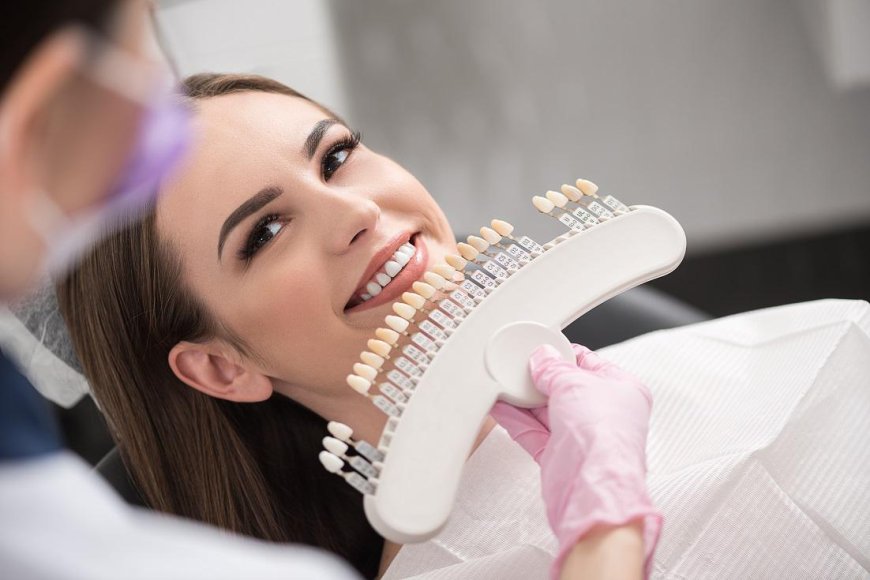How Dental Crowns Are Done
Learn about the procedure of dental crowns at our clinic. Quality care and personalized treatment for your smile.

Dental crowns are a common restorative procedure used to protect and strengthen damaged teeth. They can improve the appearance, shape, and alignment of teeth, making them a versatile option in dental care. This article will guide you through the process of getting dental crowns, explain the difference between temporary and permanent crowns, and provide insights into the benefits of this treatment.
Understanding Dental Crowns
A dental crown is a cap placed over a tooth to restore its shape, size, strength, and appearance. Crowns can be made from various materials, including metal, porcelain, resin, and ceramic. They are commonly used when a large cavity threatens the health of a tooth, after a root canal, or to cover a dental implant.
The Procedure for Getting Dental Crowns
Initial Consultation and Examination
The first step in getting a dental crown is an initial consultation with your dentist. During this visit, the dentist will examine your teeth and determine if a crown is the best treatment option for your dental issue. X-rays may be taken to assess the extent of the damage to the tooth and the surrounding bone.
Tooth Preparation
If a crown is deemed necessary, the tooth must be prepared to fit the crown. This involves reshaping the tooth by removing a portion of its outer structure. The amount of tooth structure removed depends on the type of crown being used. For example, all-metal crowns require less tooth removal compared to all-porcelain or porcelain-fused-to-metal crowns.
Taking Impressions
Once the tooth is prepared, the dentist will take an impression of the reshaped tooth and the surrounding teeth. These impressions are sent to a dental laboratory, where the crown will be custom-made to fit your tooth precisely. In the meantime, a temporary crown is placed over the prepared tooth to protect it.
Temporary Crown
The temporary crown serves as a placeholder while the permanent crown is being fabricated. It helps maintain the appearance and function of your tooth and protects the prepared tooth from damage or infection. It's important to be cautious with a temporary crown, avoiding hard or sticky foods that could dislodge it.
The Difference Between a Temporary and Permanent Crown
Understanding the difference between a temporary and permanent crown is crucial for knowing what to expect during the treatment process. A temporary crown is typically made from acrylic or composite material and is designed to be a short-term solution. It is not as durable or aesthetically pleasing as a permanent crown. Permanent crowns, on the other hand, are made from more durable materials like porcelain, metal, or a combination of both, providing long-term functionality and a natural appearance.
Receiving the Permanent Crown
Once the permanent crown is ready, you will return to the dental clinic for the final step. The temporary crown is removed, and the dentist will check the fit and color of the permanent crown. Adjustments may be made to ensure a perfect fit. Once everything is satisfactory, the permanent crown is cemented onto the prepared tooth using a strong dental adhesive.
Benefits of Dental Crowns
Dental crowns offer several benefits, making them a popular choice for restoring damaged teeth. Some of the key benefits include:
-
Protection: Crowns protect weakened or cracked teeth from further damage.
-
Restoration: They restore the shape, size, and function of damaged teeth.
-
Durability: Crowns are long-lasting and can withstand the forces of chewing and biting.
-
Aesthetics: Porcelain crowns can be matched to the color of your natural teeth, providing a seamless and natural appearance.
Aftercare and Maintenance
Taking care of your dental crowns is essential for their longevity and your overall oral health. Here are some tips for maintaining your crowns:
-
Good Oral Hygiene: Brush and floss your teeth regularly to prevent decay and gum disease.
-
Avoid Hard Foods: Be cautious with hard or sticky foods that could damage your crowns.
-
Regular Dental Check-ups: Visit your dentist regularly for check-ups and professional cleanings.
-
Address Issues Promptly: If you notice any issues with your crown, such as looseness or discomfort, contact your dentist immediately.
Potential Complications
While dental crowns are generally safe and effective, there are some potential complications to be aware of. These may include:
-
Sensitivity: You may experience sensitivity to hot or cold foods and beverages after getting a crown. This usually subsides over time.
-
Discomfort: Some patients may experience discomfort or irritation around the crowned tooth. If this persists, consult your dentist in Kelowna.
-
Damage or Loosening: Crowns can sometimes become damaged or loosened. If this happens, it's important to seek dental care promptly to address the issue.
Alternatives to Dental Crowns
In some cases, there may be alternative treatments to dental crowns that can address your dental concerns. These may include:
-
Dental Fillings: For smaller cavities or minor damage, a dental filling may be sufficient.
-
Inlays and Onlays: These are more conservative restorations than crowns and can be used for moderate damage.
-
Veneers: For cosmetic improvements, dental veneers may be an option.
Your dentist will discuss these alternatives with you if they are appropriate for your situation.
Conclusion
Dental crowns are an effective solution for restoring damaged teeth, offering protection, durability, and a natural appearance. The process involves several steps, from initial consultation and tooth preparation to receiving a temporary crown and finally the permanent crown. Understanding the difference between a temporary and permanent crown helps set realistic expectations for the treatment process.
If you're considering dental crowns, it's essential to consult with an experienced dentist. At Sopa Square Dental Clinic in Kelowna, we provide comprehensive dental care, including expert dental crowns treatment near you. Our team is dedicated to ensuring you receive the best possible care and achieve a healthy, beautiful smile. Contact us today to schedule your appointment and learn more about how we can help you with your dental needs.
What's Your Reaction?
 Like
0
Like
0
 Dislike
0
Dislike
0
 Love
0
Love
0
 Funny
0
Funny
0
 Angry
0
Angry
0
 Sad
0
Sad
0
 Wow
0
Wow
0





















































